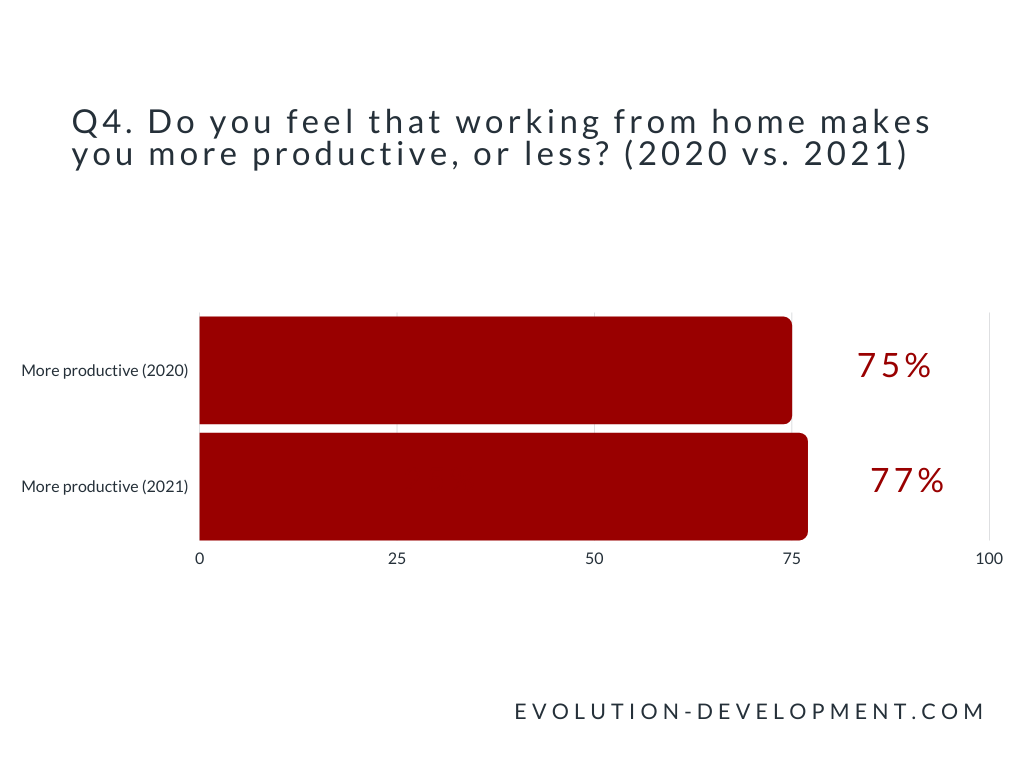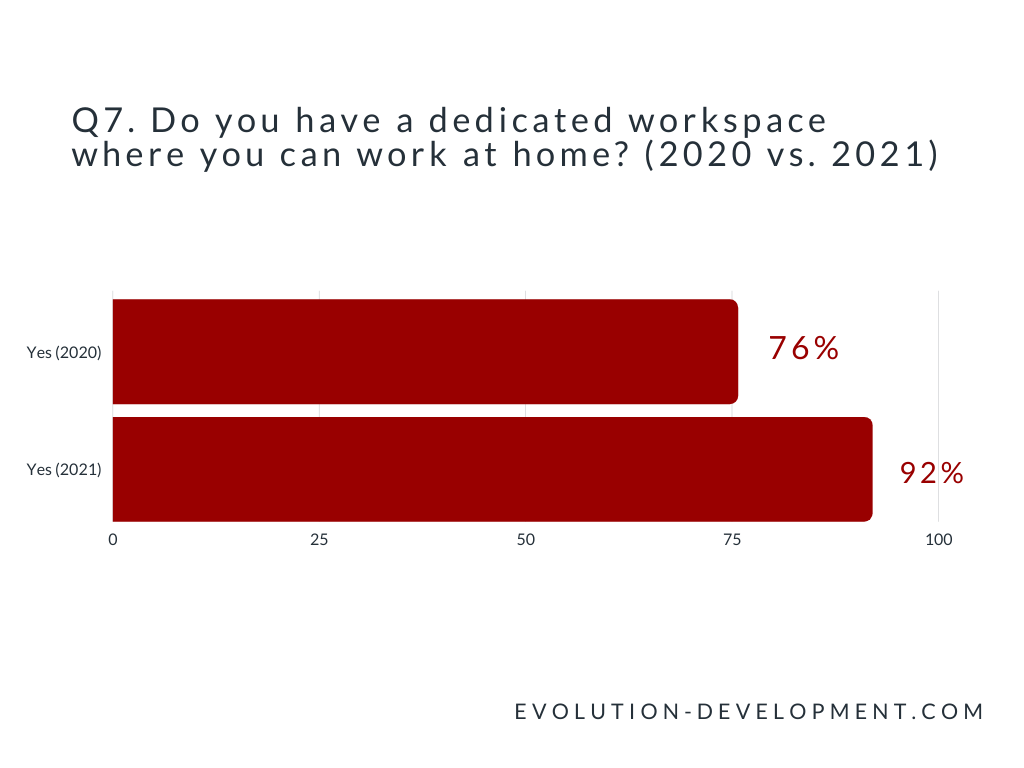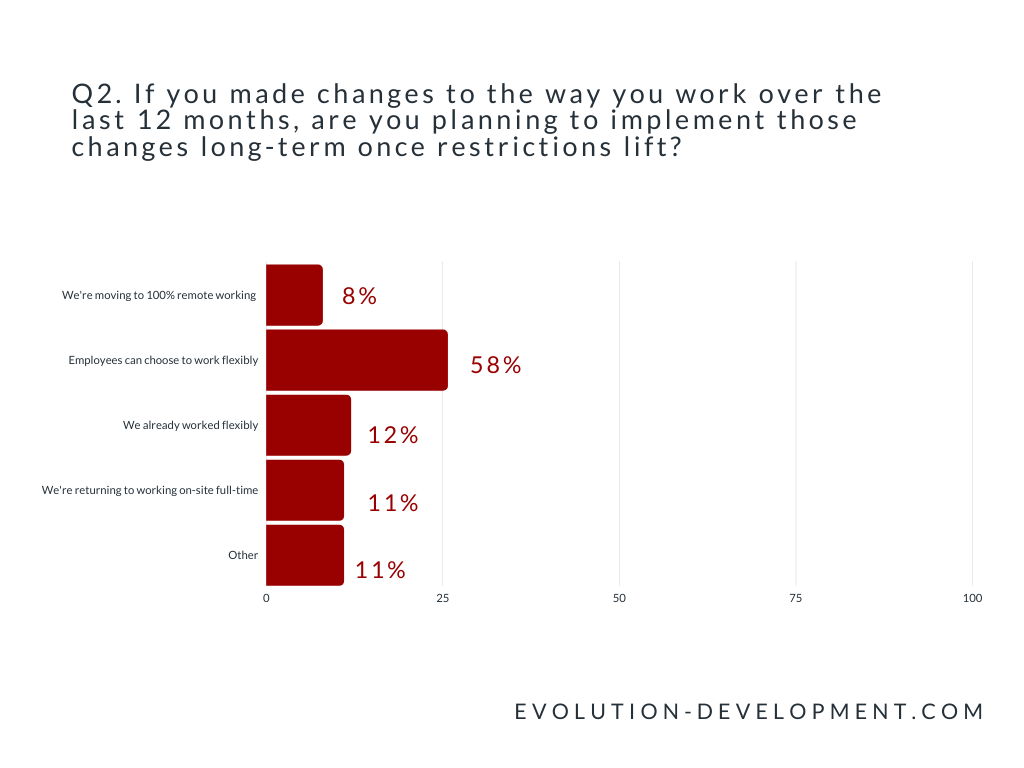We recently carried out a follow-up survey to our first Flexible Working Survey in May 2020. The results of the first survey, taken just as the first lockdown was easing and only a few months into a period of quickly-implemented remote working, showed that the overall experience of flexible working had been positive. Respondents reported feeling more productive, more motivated, with an increased level of job satisfaction. We were interested to find out whether these attitudes to flexible and remote working had stayed positive, and whether businesses and individuals were planning to implement these changes long-term, now that they had had a whole year to get used to this new way of working.
You can read a summary of the results of the first survey here. To find out how the second survey results compared to the first one, read on.
In the first survey, respondents reported an overall positive experience of working from home:
- 75% found that they were more productive working from home
- 78% felt partially or completely satisfied with the new way of working
- 63% felt more motivated to start their day, compared to their usual way of working

In our second survey, carried out in April 2021, responses reflected the same positive attitudes to flexible working:
- 77% found that they were more productive working from home
- 77% felt that their job satisfaction had increased as a result of working from home
- 76% felt more motivated to start their day, compared to their usual way of working
- 63% felt that overall, the experience of working from home had been positive
Dedicated work space
In the quick transition to flexible working, lots of people ended up working in less-than-ideal spaces: at dining tables, on the sofa, or squeezed into a spare bedroom. We were interested to find out whether after almost a year of remote working, people’s work-from-home setups had changed: had people committed to a more permanent work space now that they had settled into flexible working?
The results showed unequivocally that this was the case:
- In our first survey, 76% of respondents had a dedicated work space where they could work at home
- In our second survey, this number had increased to 92%

Are we still facing the same work-from-home challenges?
In our first survey, the biggest challenges reported were:
- Social isolation (43% of respondents)
- Finding communicating with coworkers more difficult (40%)
- Difficulty staying motivated while working alone (36%)
In our follow-up survey, the most common challenges stayed the same, but the number of respondents experiencing them had decreased significantly. The biggest challenges reported in 2021 were:
- Finding communicating with coworkers more difficult (21%)
- Social isolation (20%)
- Internet connectivity (13%)
It’s great that the number of people feeling isolated or having difficulty communicating with their team has decreased: likely a result of better working practice and better use of technology when it comes to staying in touch. However, it’s still important to address these concerns as we look at flexible working going forward: if flexible working is going to work long-term, we need to look at new ways of staying connected. A combination of office-based and remote working days could help address social isolation, and a concerted effort to keep the lines of communication open are a good place to start.
What are the benefits we get from remote or flexible working?
As with the challenges, the most commonly-reported benefits of remote working stayed roughly the same this time around. Less time commuting remained the most-reported benefit, closely followed by more time with family (20%), meetings becoming shorter and more effective, the ability to complete home maintenance tasks during breaks, and more time for hobbies and exercise.
Respondents also mentioned in our second survey that using digital tools more frequently resulted in better capability in using them, and that they saved money by commuting.
We added a new question to our second survey to gauge respondents’ attitudes to remote working one year in: ‘How do you feel about the changes to your working patterns over the last 12 months?’.
- 39% felt that having the opportunity to try out flexible working was beneficial
- Just one respondent reported looking forward to returning to working exactly as they had before the pandemic.
Will businesses be implementing flexible working long-term?
Of all the respondents surveyed in our follow-up, 58% would be offering employees the opportunity to work flexibly as a result of the pandemic, 12% already worked flexibly, and 8% were moving to remote working 100% of the time. 11% would be returning to working on-site full-time.

The results are clear: flexible working is here to stay
As with our first survey, our follow up strongly indicates that flexible working will become a part of the way we work long-term. The benefits are clear: workers and teams are still reporting increased job satisfaction, motivation and productivity, which is good news for employers and employees alike. Employees enjoy a better work/life balance and job satisfaction, and employers are rewarded with increased productivity and happy employees who work hard and stay loyal.
Of course, even after a year of adjusting to flexible working, employers must be prepared to implement structural changes and new processes to support this new way of working. Ensuring good communication, regular check-ins, and a shift from presenteeism to an output-based approach are essential. On the side of the individual, it’s important to maintain a healthy work/life balance, to manage time well, and to ensure the pressures of work don’t leach into personal time when you’re working and living in the same space.
If you’re a business implementing flexible working long-term, we can offer tailored support for your teams to include communication training, one-to-one coaching for businesses and strategy planning. Get in touch to find out more.
If you’re an individual looking for help with dealing with change, managing stress, time management or other useful topics, have a look at our online courses, which range from short 10-minute courses to longer, focused personal development programmes. We also offer business coaching, life coaching and couples or relationship coaching.